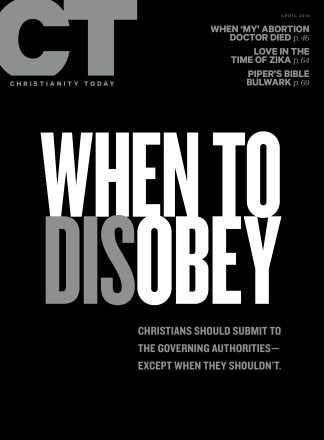On a recent trip to Israel, a group of US evangelical leaders listened to both Israeli and Palestinian voices. The Israelis grumbled that their story is not being heard in the United States, while the Palestinians complained that US media don’t present any story but that of the Israelis. It brought home the oft-repeated truth that conflicts are not only about justice but also, and perhaps more important, about competing narratives. The takeaways for the US context were obvious. We experience daily clashing narratives from Muslims, blacks, Hispanics, Asians, whites, mainliners, evangelicals, pro-choicers, pro-lifers, gays, straights, men, women, elites, the poor—to name a few.
Conflicts are not only about justice but also, and perhaps more important, about competing narratives.
Take two competing narratives in urban neighborhoods. To oversimplify: In much of the black community, the arc of the story centers on white policemen racially targeting young black men, harassing, beating, and killing without consequence. Yet law enforcement officials tell the story of facing tremendous pressures as they seek to keep the peace in neighborhoods caught in drug and gang wars.
Our narratives have various purposes. In an insightful blog post, John Hagel, co-chair of the Deloitte Center for Edge Innovation, says, “As human beings, we resist atomization and fragmentation; we yearn to connect and build on the efforts of others. We also seek meaning, purpose, and identity . . . something that narratives, and little else, are exquisitely designed to provide.” In other words, narratives define the conflict, name the antagonists, and spell out the resolution.
Narratives are, of course, biased. They rarely lie about the facts, but they are selective in their use of them. In the larger American race narrative, whites can wax eloquently about the brilliance of the Constitution but hardly note the Three-Fifths Compromise that relegated slaves to sub-human status. Many black Americans now give voice to the tragedy that much of America’s success was built on the backs of slaves, yet go on to dismiss American democracy as nothing more than a systematic assault on black bodies, from the first day up to the present.
The truth does not lie somewhere in the middle, as we are wont to say, but on both ends. The American experiment is a remarkable achievement of democratic governance, human rights, and free speech—and is riddled with hypocrisy and racism.
Thus the attempts to negate the other’s narrative, usually by labeling the other as “racist” or “troublemaker” or “Marxist” or “Islamophobic.”
Yet it is difficult to take seriously the narrative of the other. We fear that if we do, we’ll sabotage the value of our own narrative. Thus the attempts to negate the other’s narrative, usually by labeling the other as “racist” or “troublemaker” or “Marxist” or “Islamophobic,” effectively ending the conversation.
It’s also difficult to take seriously our own culpability. If we do acknowledge it, we try to mitigate it: “Yes, many black youth are violent, but it’s systemic racism that makes them that way.” “Yes, many police are excessively brutal, but it’s the pressure of dealing with lawless criminals that prompts excessive force.” In the end, many narratives are self-justifying and Manichean: we imagine the world as divided between good and evil, and we thank God we are not like the evil other.
The Christian faith has resources to deal with the inadequacy of our narratives. We Christians acknowledge that the imago Dei also contains a heart that is desperately wicked (Jer. 17). Evil runs not merely through systems but also through the human heart (Solzhenitsyn). And most important, we can admit our own culpability and engage the other who is also culpable because we both stand under the Cross, which judges injustice and forgives the unjust, all on the way to rectifying evil.
We also know that we are called to lay our social and political identities, as important as they are, at the foot of the Cross, that they might be judged and redeemed.
Practically speaking, this means that we must really listen to the other’s narrative. We have no right to expect them to hear ours if we don’t take the trouble to hear theirs. It then means that we engage each other with courage and honesty. In that dialogue, we’ll discover both the truth and the inadequacy of our narratives, as a new narrative emerges.
This is not a pipe dream but an affirmation of the new reality that Christ has already created. When we enter into dialogue like this, we’re not really creating a new narrative, but discovering the preeminent narrative of Jesus Christ (Eph. 1:9–10): “[H]e made known to us the mystery of his will . . . to bring unity to all things in heaven and on earth under Christ.”
Mark Galli is editor of Christianity Today.










